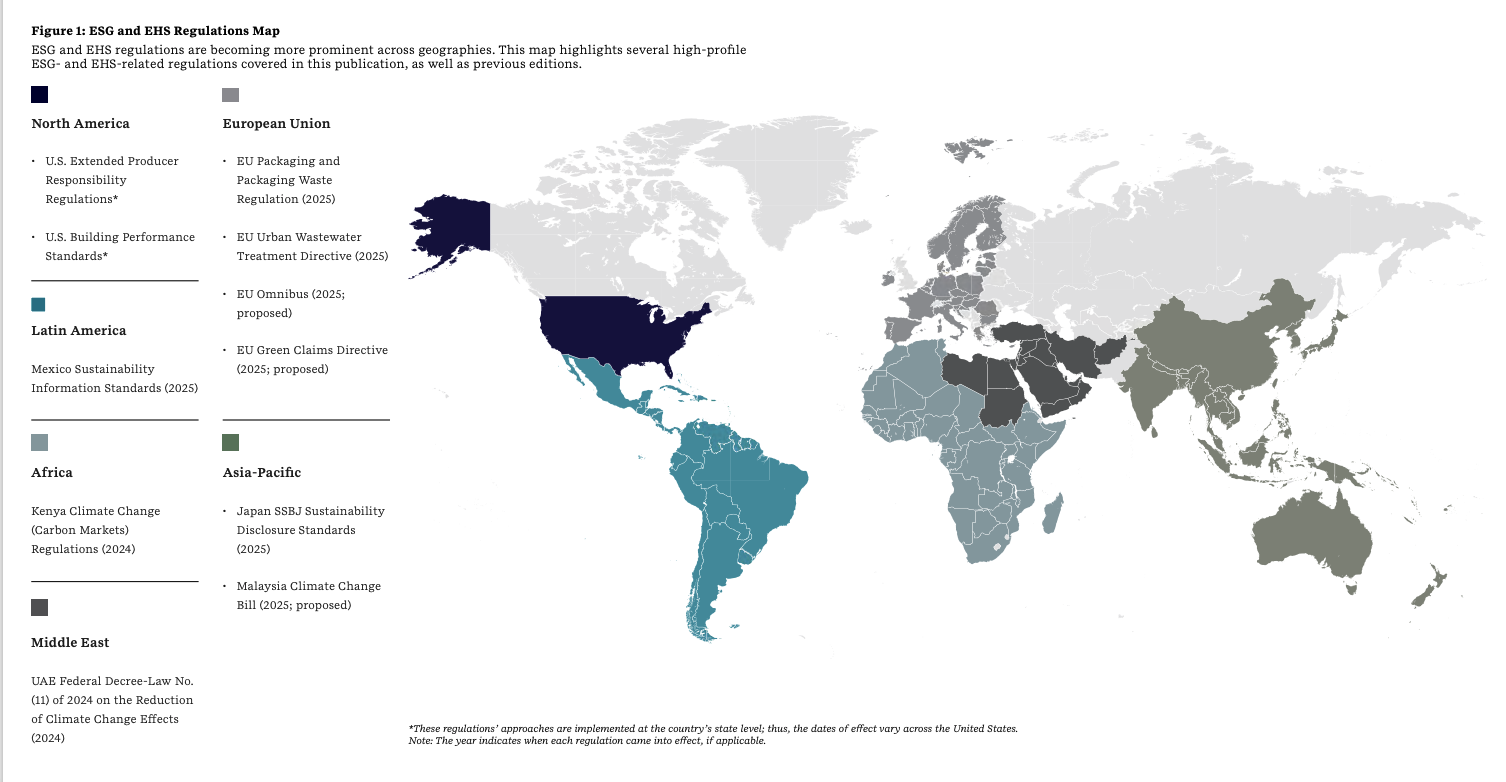If you’ve felt the pace of environmental, health, and safety (EHS) regulations have been speeding up lately—you’re not imagining it. Businesses today are juggling more compliance demands than ever before, across more jurisdictions, and with growing expectations from customers, regulators, and investors. The latest Global Regulations Radar report from ERM Sustainability Institute shows just how quickly things are evolving, and why keeping up requires a more dynamic approach.
Compliance is getting more complicated—fast
The report doesn’t give a hard number on how many new laws are coming into effect, but it paints a clear picture: regulations are getting broader and bolder. Countries like Kenya, Japan, the UAE and members of the EU are all introducing fresh rules on various aspects of EHS.
For example, the EU is raising the bar with new packaging standards and tougher wastewater treatment rules. Kenya is leading in Africa with structured carbon market regulations. Japan is stepping forward with its own sustainability disclosure standards. And the UAE is building out a national climate law that applies across sectors, including free zones. It’s a lot to track—and this is just the tip of the iceberg. It’s happening everywhere.
To put things in perspective: global ESG regulation has grown by about 155% over the past decade, according to ESG Book. That kind of growth shows how fast the compliance landscape is evolving—and why staying on top of it all is becoming such a big priority for businesses. ERM Libryo’s regulatory database also saw a total 1,107 regulatory updates across 83 countries, in just 6 months!

What’s driving this change?
Several trends are fuelling this global regulatory shift:
- More required reporting: Especially in the EU, where frameworks like the CSRD are rolling out to tens of thousands of companies. These require detailed disclosures on ESG performance, not just financials.
- Focus on climate and nature: It’s not just about carbon anymore. Businesses are now expected to account for their impact on nature, biodiversity, water and waste.
- Pressure on supply chains: New due diligence laws mean companies must go beyond their own walls and take responsibility for what happens across their entire value chain.
All of this means compliance is no longer a box to tick—it’s a moving target that touches nearly every part of a business.

Risks of falling behind
When regulations change this fast, the risk of missing something increases rapidly. The consequences of non-compliance aren’t just financial, e.g. fines, it can also result in shutdowns, reputational impact, losing your license to operate, or even imprisonment.
Relying on spreadsheets or static documents to track legal obligations simply isn’t enough anymore because the law doesn’t stay static. As soon as a spreadsheet is completed, it’s time to check the legislation for updates once again. Companies need a smarter, faster way to see what applies to them and act quickly.
How ERM Libryo helps you keep up with regulation
That’s exactly where ERM Libryo comes in. The platform helps businesses cut through the noise by delivering legal requirements that are tailored to your operations, automatically updated whenever the laws change at the source, and critically – makes it easy to understand.
Libryo makes it simple to:
- See what applies to you, across different jurisdictions and levels (national/state/city)
- Stay on top of what’s changed or what’s new
- Act fast using the right information to comply
- Get visibility of overall and facility-level compliance and address gaps/risk
Whether you’re expanding into new markets or just trying to keep your existing operations compliant, Libryo gives you the clarity and confidence to move forward. No guesswork. No scrambling. Just knowledge.
Get in touch with us today to see how the ERM Libryo platform could keep your organization up-to-date.
🔎 Download the full Global Regulations Radar report to explore the latest regulatory developments in more detail.
